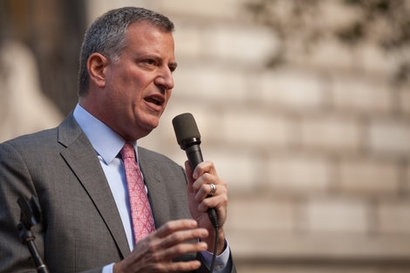
The Clean Fleet plan will cut municipal vehicle emissions in half by 2025 – and 80 percent by 2035 – and serve as a model for the private sector and other 21st century cities in fighting climate change. The project is the latest in a series of ambitious but necessary climate initiatives outlined in the Mayor’s OneNYC plan which sets a long-term goal of reducing all greenhouse gas emissions across New York City by 80 percent by 2050. Currently, the transport sector accounts for nearly one-quarter of citywide greenhouse gas emissions.
“A cleaner, greener fleet is yet another step toward our ambitious but necessary sustainability goals, including an 80 percent reduction in all emissions by 2050” said Mayor Bill de Blasio. “By building the largest municipal electric vehicle fleet in the country – and potentially the world – New York City is continuing to lead by example. Cities are setting the pace on climate action – and with our city and our planet's very future at stake, we need national leaders in Paris to take note and take action.”
City-owned and operated vehicles account for approximately four percent of citywide transportation emissions, or 13 percent of the City government’s emissions, creating the polluting equivalent of an 80 MW coal power plant. The Clean Fleet plan will replace approximately 2,000 fossil fuelled sedans with plug-in electric vehicles (EVs). When combined with over 300 EVs already on the road, this would mean EVs making up half of the city’s non-emergency sedans, thereby creating the largest municipal EV fleet in the US and, potentially, the world. This would reduce gasoline consumption by approximately 2.5 million gallons a year and reduce the City fleet’s emissions by nine percent by 2025.
Other measures include the use of anti-idling, hybrid, and stop-start technologies in medium- and heavy-duty vehicles; an increase in the use of alternatives to traditional diesel fuels; a Request for Information for additional cutting-edge technology solutions for both light- and heavy-duty vehicles, including advanced battery EVs, hydrogen fuel-cell vehicles, compressed natural gas vehicles, and other clean fuels; best-practices in fleet management that limit the usage of SUVs based on specific security or operational needs, promote eco-driving to optimize fuel efficiency through education and training and the expansion of car and ride sharing to support more efficient vehicle use.
The City expects relatively incremental capital costs over the next ten years to support necessary upgrades to electrical systems in support of new charging capacity.
Nilda Mesa, Director of the Mayor’s Office of Sustainability, added that NYC is “walking the talk” and that cutting greenhouse gas emissions in the city’s own fleet will also cut air pollutants that trigger asthma and other respiratory diseases, enabling the city to lead the way in demonstrating that the technology is available and at manageable cost.
For additional information:

